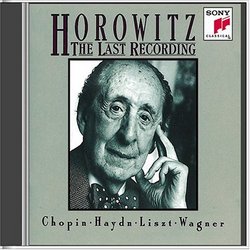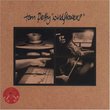| All Artists: Haydn, Liszt, Wagner Chopin, Vladimir Horowitz Title: Horowitz: The Last Recording Members Wishing: 0 Total Copies: 5 Label: Sony Release Date: 3/30/1990 Genre: Classical Styles: Forms & Genres, Fantasies, Sonatas, Historical Periods, Classical (c.1770-1830), Modern, 20th, & 21st Century Number of Discs: 1 SwapaCD Credits: 1 UPC: 074644581829 |
Search - Haydn, Liszt, Wagner Chopin, Vladimir Horowitz :: Horowitz: The Last Recording
 | Haydn, Liszt, Wagner Chopin, Vladimir Horowitz Horowitz: The Last Recording Genre: Classical
![header=[] body=[This CD is available to be requested as disc only.]](/images/attributes/disc.png?v=15401716) ![header=[] body=[This CD is available to be requested with the disc and back insert.]](/images/attributes/disc_back.png?v=15401716) ![header=[] body=[This CD is available to be requested with the disc and front insert.]](/images/attributes/disc_front.png?v=15401716) ![header=[] body=[This CD is available to be requested with the disc, front and back inserts.]](/images/attributes/disc_front_back.png?v=15401716) |
Larger Image |
CD DetailsSimilarly Requested CDs
|
Member CD ReviewsReviewed on 8/21/2006... Outstanding selection of work performed by one of the world's greatest pianists. 0 of 2 member(s) found this review helpful.
CD ReviewsLast, but Not Least Hank Drake | Cleveland, OH United States | 04/27/2003 (5 out of 5 stars) "Vladimir Horowitz had just celebrated his 86th birthday when sessions for this recording began in October of 1989. He had recently been lured to Sony Classical by their new director, Gunther Breest, who had signed Horowitz on at Deutsche Grammphon in 1985. One advantage that Sony carried, besides a bigger paycheck, was the latest technology. This recording utilized Sony's then new 20-bit technology, which resulted in a more defined sound picture for this most subtle of pianists.The contents of this CD were all new to the Horowitz discography. By the late 1980s, Horowitz had refined and stripped down his art to the essentials. There are none of the histrionics of his early recordings, nor any of the attempts to prove to the listener that he could still play the fastest and the loudest which marred some of his recordings from the 1970s.Horowitz was stimulated by Haydn's diverse pianistic textures and whimsical changes of mood. The first movement, a bouncy Allegro, is a perfect demonstration the "controlled freedom" of Horowitz's late period. While following the same basic pulse, Horowitz introduces tiny alterations of tempo which keeps the music flowing coherently, without sounding metronomic. The rapidly ascending scale passages here are played with a dazzling evenness of touch. The slow movement, a true cantabile, is phrased as though it were being sung rather than played. The minor key outburst is, for a rarity, truly shocking. The Finale is played with a gentle virtuosity which never goes beyond the bounds of appropriate Haydn style.Horowitz recorded more of Chopin's music than that of any other composer. He was justly famous for his performances of Chopin's Mazurkas, which seamlessly blended the dance and poetic elements. The performance of the C minor Mazurka here makes one regret he didn't record many more. Horowitz was fanatically passionate about Ignaz Friedman's performances of the Nocturnes, but recorded surprisingly few himself. Many of his earlier recordings of the Nocturnes were played on too large a scale, with a prevalent note of hysteria. The two Nocturnes presented here are another story indeed. There is a rare sense of repose, at times an almost deathly calm, about these performances. There is also Horowitz's rare ability to weight the various elements of melody, harmony, and accompaniment, down to the smallest micron. Horowitz' floating of the top, middle, and lower lines, interweaving them effortlessly, is in many ways more stunning than any kind of thundering virtuosity. But if it's the more obvious kind of virtuosity you want, it is amply demonstrated in the Fantasie-Impromptu. Played at an extremely fast tempo, Horowitz demonstrates here that fidelity and freedom with regard to the score can coexist. He is one of the few pianists who bothers to repeat the first phrase as a quieter echo of the forte statement--as indicated in the score. He also preserves the structure of the piece by maintaining the initial tempo in the central section rather than slowing down to chase rainbows--and he adds some tiny embellishments along the way. Horowitz is technically and musically on top of the A-flat Etude, but the E Minor Etude suffers from an overstressed ending.Horowitz was very selective about which Liszt he chose to preserve on recordings. For this recording, he chose the rarely played Prelude from Weinen, Klagen, Sorgen, Zagen, a desolate reworking of a theme from J. S. Bach's Cantata No. 12. Horowitz masterfully alters the mood for each variation, while maintaining the inner continuity of the piece.Naturally, the Wagner/Liszt Liebestod (literally, "Love/Death") would have extramusical implications due to the circumstances of the recording. It is true, Horowitz plays the aria as if he knew this would be his swansong, giving the performance all the eroticism, lyricism, and thundering virtuosity he could muster, for the last time. He died on Sunday, November 5th, four days after the Liebestod was taped. This recording is a must for all Horowitz admirers, indeed, for all those who value great piano playing. The informative and moving liner notes are by Horowitz's friend and junior colleague Murray Perahia, who was with the Maestro the day before he died." The Last and One of the Very Best Classicalfan | Reston, VA USA | 11/22/2005 (5 out of 5 stars) "It is truly amazing to think that Horowitz was 86 years old when he made this recording. The virtuoso passages of Chopin that require fingertip pyrotechnics are played with flawless precision and a sense of nuance and shading that is exquisite. At his very best, Horowitz took music to a level where he made the piano into his palette and painted a marvelously subtle musical picture. On the slower passages, every note and even the intervals between the notes exhude a calm self-assured artistry. This is not just wonderful music; it is sheer poetry. As Murray Perahia writes in his touching essay in the CD insert, Horowitz felt that what made a composer truly classical was "an intensity and purity of expression where every note matters, every note has meaning." One certainly hears and feels that intensity and purity on this CD.
There is also a noticeable improvement in sound quality on this CD, that was recorded digitally, in comparison to earlier Horowitz recordings I have heard from the analog era. How fortunate we should all feel that he lived into the digital era and was still playing at such a sublime level into his final years, so that he could leave us this musical legacy. My personal favorite on this CD is track 6, the "Fantaisie-Impromptu, Op. 66 of Chopin, which is played with dazzling scintillating brilliance and, at the same time, superb control, subtlety, and deep emotion. However, a close second for me is the tenth track, Liszt's "Weinen, Klagen, Sorgen, Zagen" a Prelude based on a theme from Bach's Cantata No. 12. Horowitz's performance of this composition is achingly beautiful. The CD booklet has an excellent essay by Murray Perahia in English, with German, French and Italian translations. A wonderful CD and fitting memorial to one of the greatest pianists of the twentieth century." |

 Track Listings (11) - Disc #1
Track Listings (11) - Disc #1




![The Ink Spots - The Greatest Hits [MCA]](https://nationalbookswap.com/cd//m/61/4061/24061.jpg)



